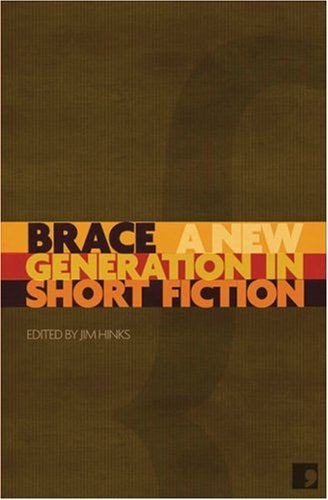
photo by M&J
by Anushree Nande
But, all the same, they pressed too hard
against an acid green field of winter wheat:
the edges were too square, the fences too sharp to pass.
The start of a story is always a good indicator of where the narrative is eventually going to lead. In Guy Ware’s ‘Witness Protection’, found in the Brace anthology, there is an intense sense of foreboding within the opening paragraph. At first glance it is very visual and vivid, but there is also a certain unease coming from the choice of words – acid, sharp, square, pressed too hard – which points towards a potentially violent and disturbing undercurrent.
This cold, stripped down style of language intensifies as the story moves along, heightening the overall chill and the psychological breakdown within the story. The minimal use of adjectives and emotions creates the perfect atmosphere for the mysteries that are at the core of the narrative, that of a possible false identity and an unreliable reality. The stark title alone – ‘Witness Protection’ – points to secrets, hidden layers, possible misinformation and changing identities.
The narrative revolves around Henry and Stella, and their seemingly routine life that hides secrets, lies and, possibly, violence beneath the surface. It’s an unsettling environment that’s made more so by Ware’s highly successful use of the unreliable narrator.
 Initially, we see Henry enter Stella’s home. We see him explore the house and the belongings of Stella’s husband, Guy West. But, as the story progresses, Henry’s viewpoint becomes increasingly erratic and questionable, and we are assume we cannot believe his version of reality.
Initially, we see Henry enter Stella’s home. We see him explore the house and the belongings of Stella’s husband, Guy West. But, as the story progresses, Henry’s viewpoint becomes increasingly erratic and questionable, and we are assume we cannot believe his version of reality.
At the beginning of the story, Henry thinks about the death of Guy West and how he has taken on this dead man’s identity. Stella refers to Henry as ‘Guy’ and Henry feels she is ‘in’ on the secret. At one point he almost winks at her in collusion. But when he tells her he is ‘Henry Fielding’, that he was a witness to a man being ‘killed – executed – by five armed policemen on a Midland Mainline train’, that the man had been unarmed, innocent, and that the policeman had changed the story, we see that Stella persists in calling him ‘Guy’:
She said, “It’s alright, Guy. I know.”
“I’m not Guy, I’m Henry. I’m a witness. I saw it.”
As the couple lie in bed, Stella explores Henry’s body, ‘as if she had never seen it before’ and it is suggested that ‘Henry Fielding’ might just be an identity adopted by a man who isn’t mentally stable; a figment of Guy West’s imagination.
Even asleep he was pretending, dramatising. If he wanted to be someone else, to pretend that his real life was just a cover story, so what? What harm would it do? Was there anything so terrible about that? Reality had not done him any favours, she thought. Or her.
About halfway through the story, though, Stella begins to acknowledge the fact that he is indeed Henry, though her remarks are challenging:
Stella smiled and rubbed her cheek against his chest. She said, “Henry, you’re married, aren’t you?”
He looked at her. “Oh yes.”
“Then I suppose this can’t last.”
He didn’t reply.
“Do you have children?”
“Yes,” he said, not realising the stakes. “A boy and a girl.”
Her body had stiffened against his; neither of them said anything more.
Stella thinks about Guy and blames herself for everything that happened – though we, as readers, never really know what occurred. Her thoughts are contradictory and confusing. With the line, ‘She hadn’t seen him die …’, we assume that Stella is referring to Guy’s death or murder, which Henry has previously spoken of, but, as the paragraph continues, we realise she isn’t talking of his literal death, but of his metaphorical death:
She hadn’t seen him die, wasn’t sure what happened. Ten years ago maybe when he had started travelling for work and they’d seen so little of him. Or maybe four years ago. Or maybe three years ago when they moved here. When the factory closed […] he was different now – there was no denying it – but why had she not spotted the change? Why had she not done something to prevent it? […] Now she was left with this […] imposter, and she blamed herself.
Ware is clearly trying to play with our perceptions and make us doubt and second guess our understanding of the story and the world he has created. A classical hint pointing to the existence of an unreliable narrator is usually a claim of previous or recent illness, mental or otherwise. This is true in the case of Guy West, who is revealed to have been at St. Andrew’s Hospital, after becoming ‘depressed and ill’.
There is also a subtle suggestion that one of the triggers of Guy’s mental deterioration and depression was the death of his and Stella’s twelve-year-old daughter, Annabelle (though, again, the reader never really finds out the truth of what happened). But, throughout the story, Ware neither confirms nor refutes any of the information  revealed, and with these intended gaps in the narrative, we, as readers are almost forced to be more involved and interact with the narrative possibilities.
revealed, and with these intended gaps in the narrative, we, as readers are almost forced to be more involved and interact with the narrative possibilities.
Our belief in Henry starts on the first page, with a line about the house: ‘It was perfect for his purposes’. This is followed by the introduction of Guy West: ‘Guy had been ill. I’ve been ill. That was their point.’ And, right after this moment, the protagonist, as yet unnamed, mentions being dropped off by an ambulance, leading us to the assumption that he really has been ill or injured.
We quickly make the link between these sentences and the title of the story – ‘Witness Protection’ – and assume that the protagonist’s purpose is to stay hidden as part of a protection programme. To add to this collusion, the protagonist keeps referring to a collective of people as ‘they’, but we never find who ‘they’ are. Nor do we discover how Henry can get away with being Guy, unless they look very similar. ‘They’d done a good job with the photographs, he had to give them that. You couldn’t see the joins.’
As the narrative progresses, we are left with more questions than answers – about whether Guy is mentally ill, or whether Stella doesn’t realise Henry really is an imposter. The hope that these questions might be answered, even partially, is what keeps us reading. A sense of drama slowly creeps up on us, as Ware subtly increases the intensity of the information revealed, and it is up to the reader to draw the conclusions:
When they had cast around for an identity to hide him in, how had they alighted upon this public schoolboy failure – with the dead daughter and the giant of a son and the sexy, tiring wife? He couldn’t have been completely clean. He must have been known; they had to have been aware that he was ill, that he might die, that Stella would co-operate.
In the anthology’s introduction, Jim Hinks, the editor of Brace, talks about Hemingway’s ‘iceberg effect’. He refers to a short story’s significant depth, to the fact that more than half of a good story lies under the surface, almost as a parallel narrative. For me, ‘Witness Protection’ is so successful because of Ware’s perfect balance between the said, the unsaid and the hinted at – as well as his awareness of when to release information to the readers and just how much to give away.

